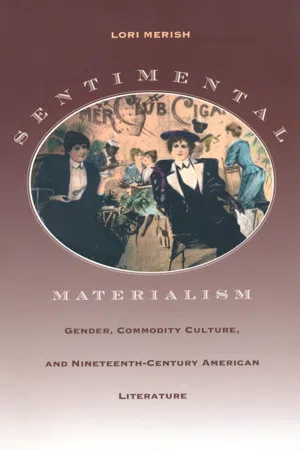
Sentimental Materialism
Gender, Commodity Culture, and Nineteenth-Century American Literature
- English
- PDF
- Available on iOS & Android
Sentimental Materialism
Gender, Commodity Culture, and Nineteenth-Century American Literature
About this book
The phenomenon of female consumption was capitalism's complement to male production: It created what Merish calls the "Other Protestant Ethic,"a feminine and sentimental counterpart to Max Weber's ethic of hard work, economic rationality, and self-control. In addition, driven by the culture's effort to civilize the "cannibalistic" practices of ethnic, class, and national otherness, appropriate female consumerism, marked by taste and refinement, identified certain women and their families as proper citizens of the United States. The public nature of consumption, however, had curiously conflicting effects: While the achievement of cultured material circumstances facilitated women's civic agency, it also reinforced stereotypes of domestic womanhood.
Sentimental Materialism's inquiry into middle-class consumption and accompanying ideals of womanhood will appeal to readers in a variety of disciplines, including American studies, cultural studies, feminist theory, and cultural history.
Frequently asked questions
- Essential is ideal for learners and professionals who enjoy exploring a wide range of subjects. Access the Essential Library with 800,000+ trusted titles and best-sellers across business, personal growth, and the humanities. Includes unlimited reading time and Standard Read Aloud voice.
- Complete: Perfect for advanced learners and researchers needing full, unrestricted access. Unlock 1.4M+ books across hundreds of subjects, including academic and specialized titles. The Complete Plan also includes advanced features like Premium Read Aloud and Research Assistant.
Please note we cannot support devices running on iOS 13 and Android 7 or earlier. Learn more about using the app.
Information
Table of contents
- Contents
- Acknowledgments
- Introduction: The Forms of Cultured Feeling
- Chapter 1. Embodying Gender: Sentimental Materialism in the New Republic
- Chapter 2. Gender, Domesticity, and Consumption in the 1830s: Caroline Kirkland, Catharine Sedgwick, and the Feminization of American Consumerism
- Chapter 3. Sentimental Consumption: Harriet Beecher Stowe, Nathaniel Hawthorne, and the Aesthetics of Middle-Class Ownership
- Chapter 4. Domesticating "Blackness": Harriet Jacobs, Sojourner Truth, and the Decommodification of the Black Female Body
- Chapter 5. Fashioning a Free Self: Consumption, Politics, and Power in the Writings of Elizabeth Keckley and Frances Harper
- Chapter 6. Not "Just a Cigar": Commodity Culture and the Construction of Imperial Manhood
- Conclusion
- Notes
- Works Cited
- Index